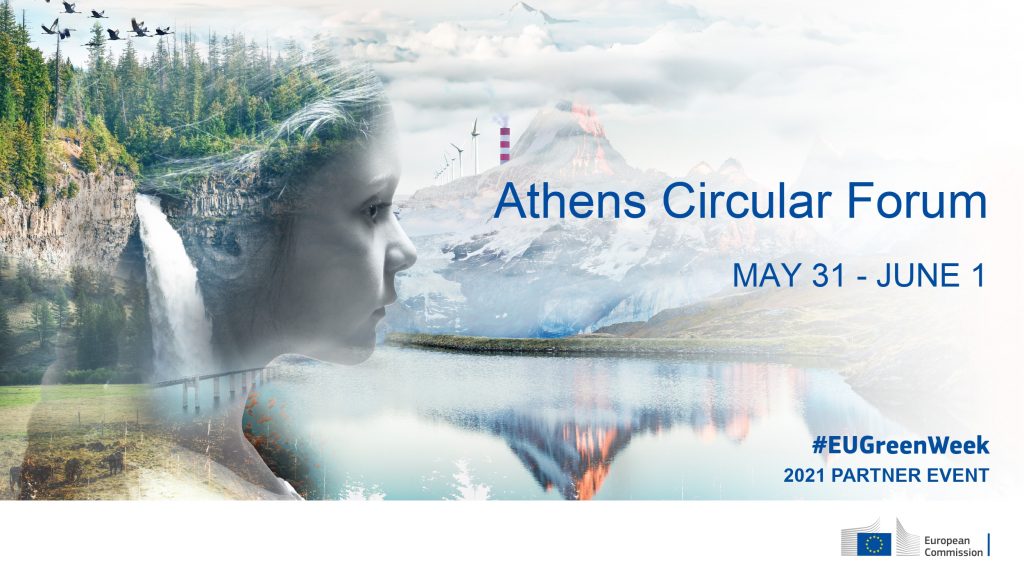Published: 17/06/2021 News

On Tuesday, June 1, 2021 Mr. Vasilis Pyrgiotis, Senior Project Manager at NEUROPUBLIC presented LIFE GAIA Sense project during the two-day online event “Athens Circular Forum II”, organized by a network of the most active players in the green transition in Greece, including the Bank of Greece, Sporos Platform, Symbiosis, EIT Climate-KIC, Athina Research, the Regional Growth Conference, the University of Aegean, UN SDSN, Green Fund and the Hellenic Association of Space Industry, during the EU Green Week
LIFE GAIA Sense was presented as a Circular Best Practice during the 4th panel entitled “Circular and Bio as Business Practice” since gaiasense is an innovative smart farming solution that contributes significantly to climate change mitigation and adaptation, and fosters the development towards a low-emissions and climate-resilient economy.
The interventions of all speakers were extremely interesting, referring both to the importance of the LIFE Programme and to the need of digitalization and adaptation of smart farming services through the utilization and processing of satellite images for agriculture.
You can find as follows, short summaries of the presentations made along with the timestamps of the relevant video (available in Greek).
Dimitris Chomatidis, Circular Economy Officer, Green Fund, LIFE-IP CEI-Greece (1:22 – 9:23)
Mr Chomatidis presented a wide range of initiatives taken by the Green Fund (a supervised body of the Ministry of Environment and Energy and Greek Life Contact point) concerning circular economy and climate change, emphasizing in the deliginization and the Development Transition plan of the region of Western Macedonia and Peloponnese.
Prof. Konstantinos Aravossis, Secretary General of Natural Environment and Water of the Ministry of Environment and Energy (11:45 – 29:00)
Prof. Konstantinos Aravossis, analyzed the main points of the new Road Map for the Circular Economy and the most important legislative initiatives, such as the incorporation and update of the EU Directive concerning the abolition of single-use plastics from July 2021. He further noted that in the coming years, 67 actions are expected to be carried out aiming at a more sustainable production and consumption. Indicative examples of the aforementioned actions are the reduction of waste production, the improvement and modernization of the existing management infrastructures but also the creation of alternative waste management systems. These actions will be implemented by the end of 2025 and the role of the National Council for the Circular Economy is expected to be particularly important.
Effie Lazaridou, CEO of the NPO New Agriculture for a New Generation (NGNG) (29:12 – 46:30)
Mrs Lazaridou highlighted the regional actions supporting the bio-economy and the empowerment of young farmers with the innovative tools of NGNG throughout Greece. Particular mention was made on pollution caused by the agri-food sector, as well as on food waste but also on the initiatives of the NPO concerning the proper management of plastics in agriculture and the implementation of the first and only training program for producers and entrepreneurs of the agri-food sector for circular agriculture. The ultimate goal of NPO is to convert the global health system to a climate-neutral through the adoption of a new business model for sustainable development based on the knowledge and understanding of our complex ecosystems.
Athanasios Potsis, President of the Hellenic Association of Space Industry (46:40 – 1:13:47)
Dr. Potsis presented innovative space applications utilized by Greek companies that accelerate the green transition, with emphasis on climate adaptation, pollution reduction, and precision agriculture. During his presentation, Dr. Potsis chose to make a special mention of NEUROPUBLIC by presenting a map of the gaiasense infrastructure (gaiatrons telemetric stations and sensors deployed all over Greece and abroad) as an example of an innovative technological smart farming solution that utilizes the capabilities of space and remote sensing.
Vasilis Pyrgiotis, Senior Project Manager at NEUROPUBLIC/ Coordinator of LIFE GAIA Sense project (1:14:00 – 1:36:43)
Mr Pyrgiotis presented LIFE GAIA Sense, be it a Circular Best Practice, and analyzed the so far achieved results. He explained that the use of digital tools, such as gaiasense can contribute to the protection of the environment, natural resources, and energy conservation. He also underlined that the gaiasense system is a Greek innovation that combines information technologies with agronomic science in a holistic way. gaiasense is pioneering at a European level in the field of smart farming since it enhances and optimizes the decision making and precise applications in agricultural crops no matter how small or large scale they are. gaiasense collects data from the field, the satellite, the scientist, and the farmer, and provides the tools to the agricultural advisor, the researcher and the farmer in order for them to take advantage of every opportunity to produce better, more and economical agricultural product from the Greek land.
Elias Damian, Head of External Monitoring Team of the LIFE Programme, Nemo, Close-2-market contact point, SEE (1:36:43 – 1:56:11)
Mr Damian demonstrated during his intervention the significant role of the LIFE Programme for the sustainable development and competitiveness of SMEs. He pointed out the evolution of the programme during the last decades as well as the impact it has on both the environment and the European and national economy as it contributes to the GDP of each country and creates direct and indirect jobs. He also mentioned that LIFE programme has now introduced the C2M (close-to-market) initiative that supports the creation of structures that enhance the commercial utilization of a project’s results after its completion. At the end of his speech he referred to successful examples of C2M LIFE projects from other European countries but also to sectors of the Greek economy that are most likely to get funded by the LIFE Programme in the near future.